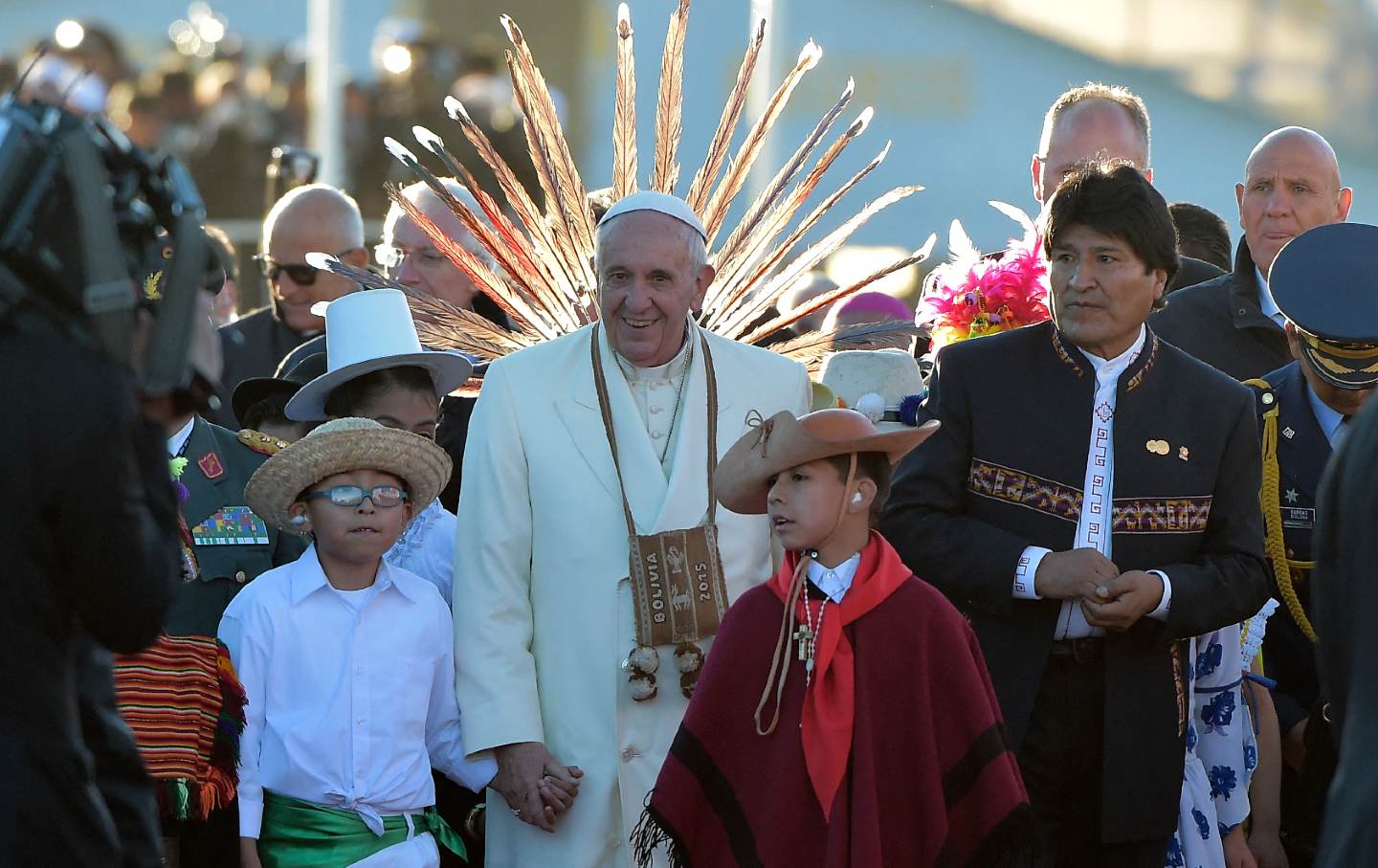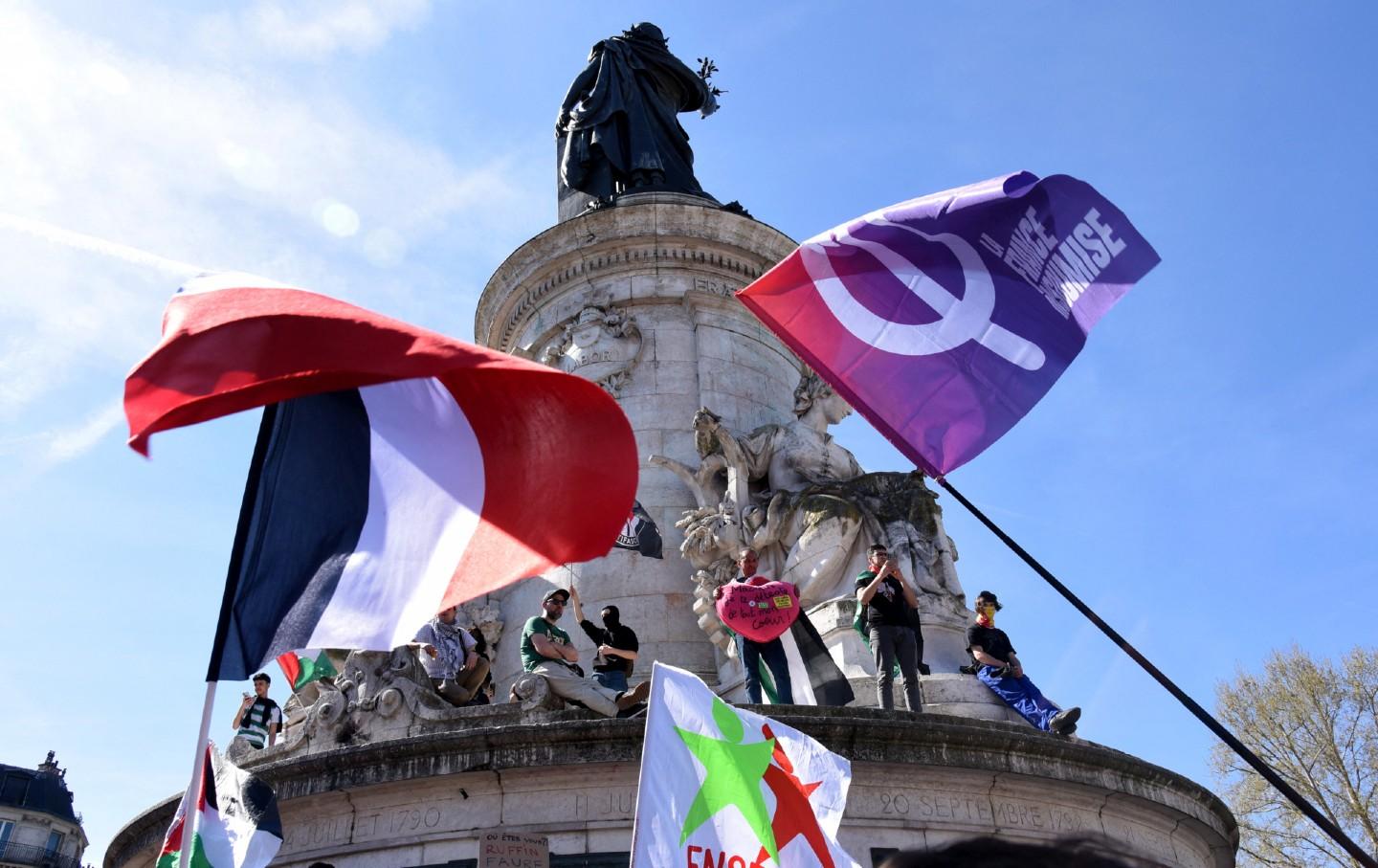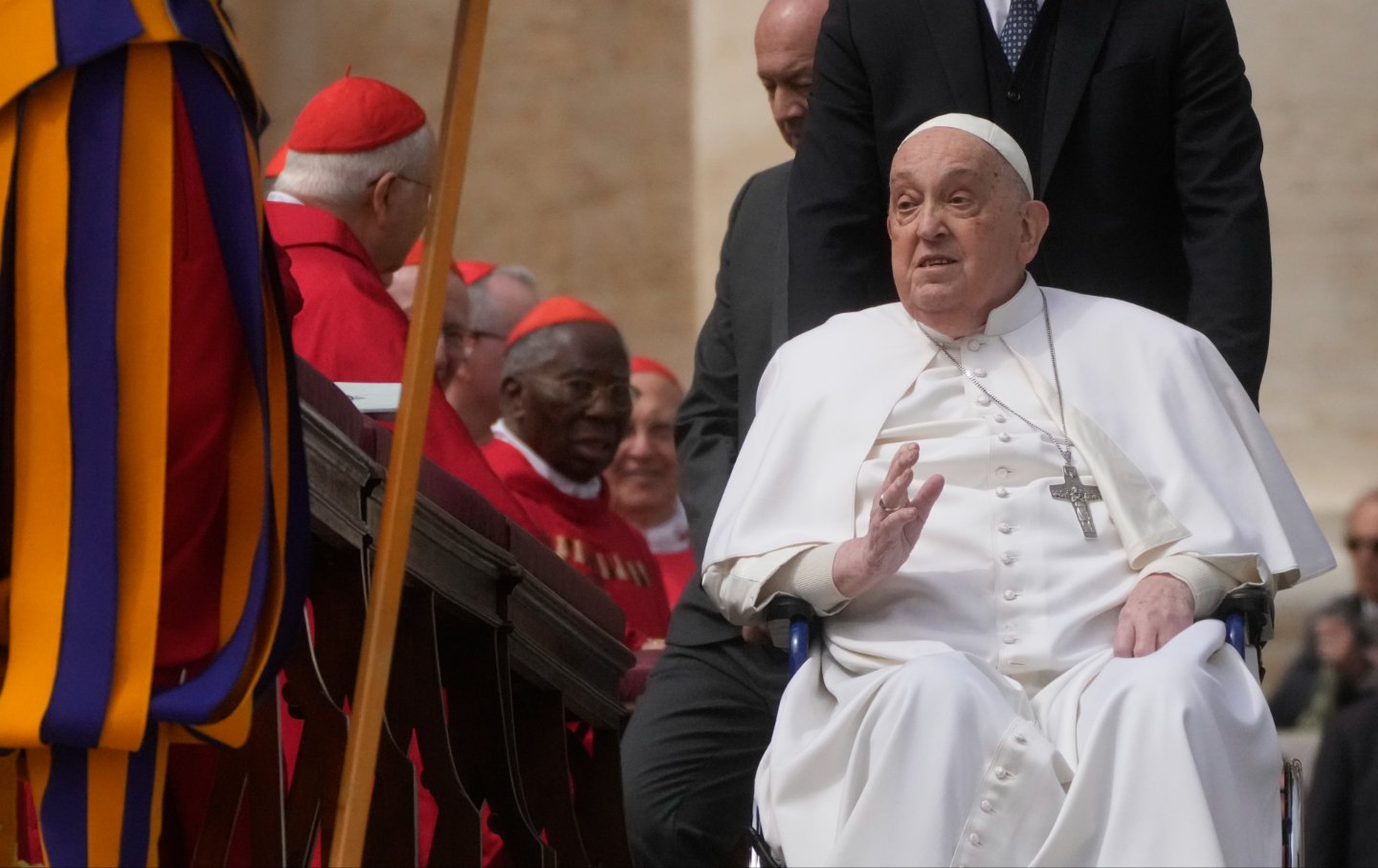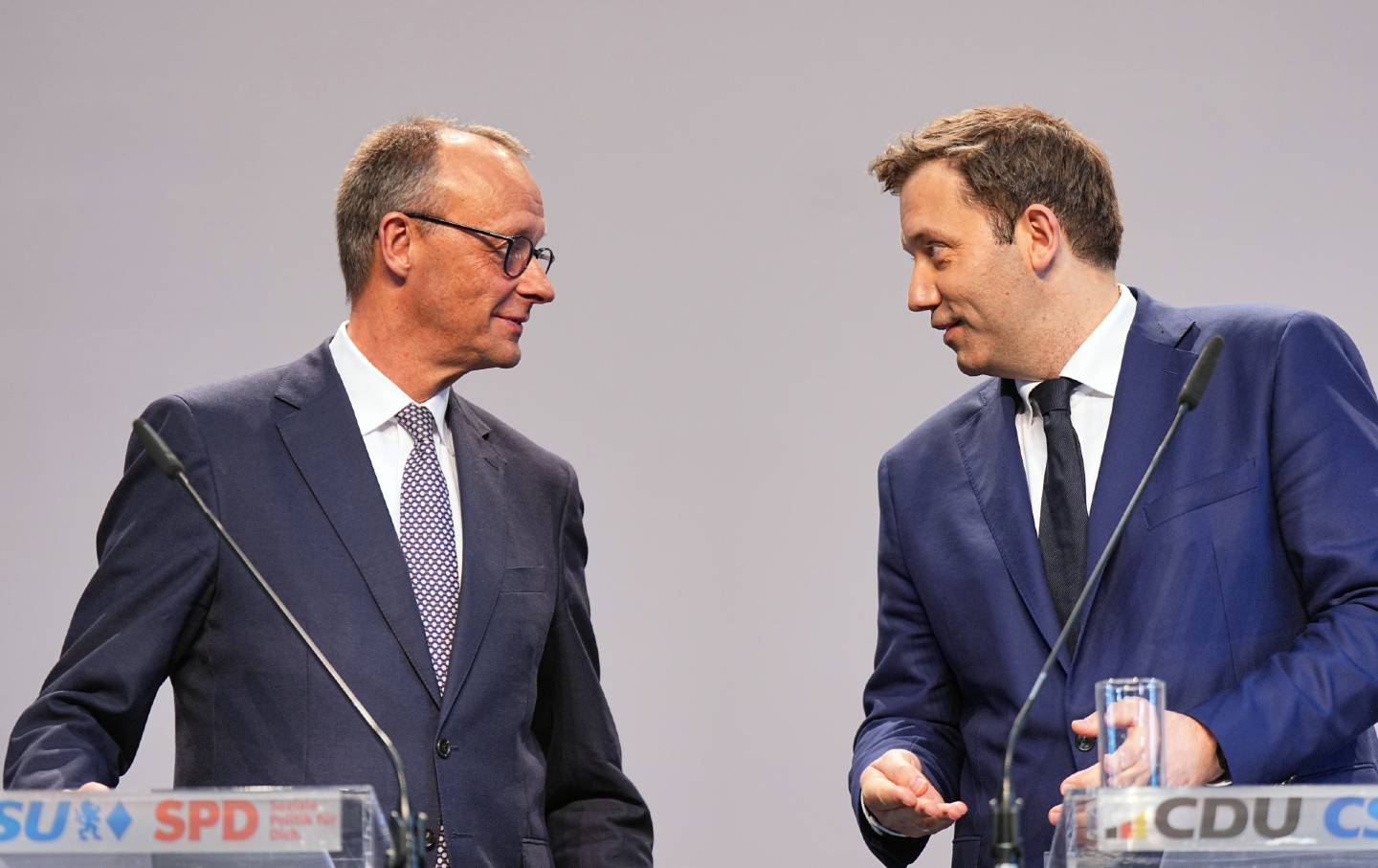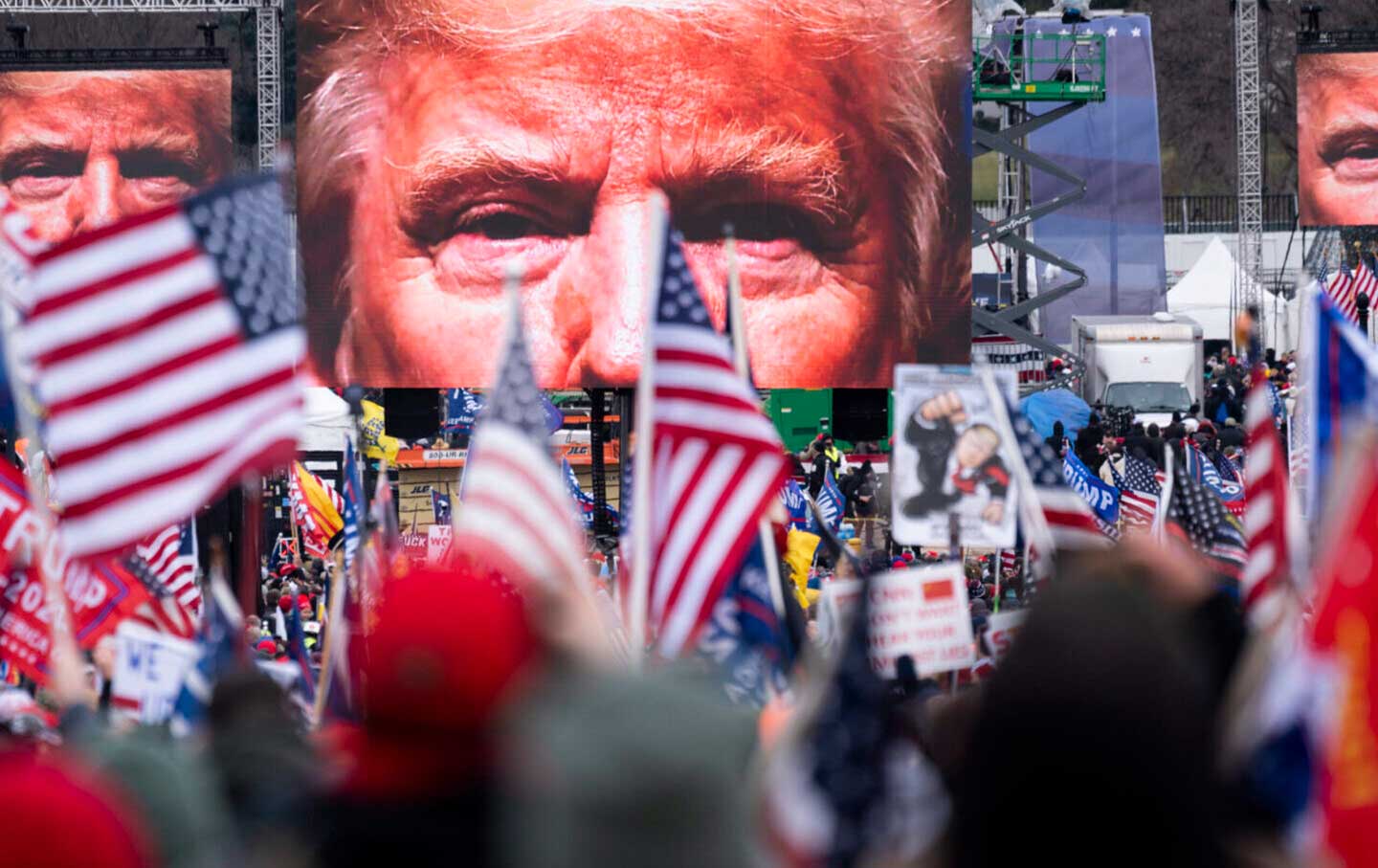The Crackdown Has Begun: Israel Goes After Critics of Its Gaza War
Palestinians and Jews in Israel are being suspended from universities, fired from jobs, and subjected to night arrests—all because of social media posts.
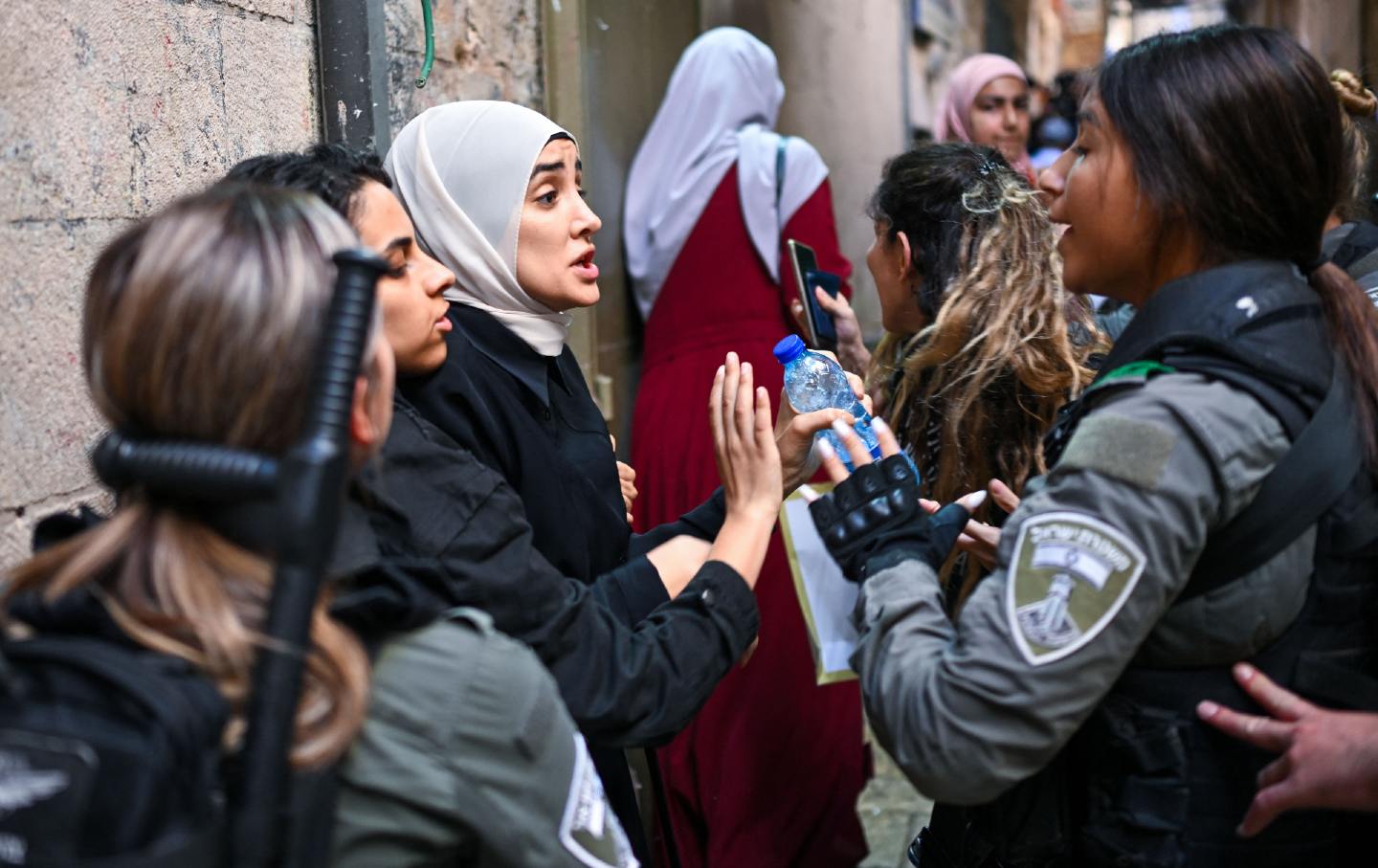
Palestinian women are stopped by members of the Israeli security forces in the old city of Jerusalem as they arrive for the Friday noon prayer on October 13, 2023.
(Yuri Cortez / AFP via Getty Images)“Hello Dr. X. A complaint was submitted to us regarding the fact that on October 7 you uploaded a profile picture on your Facebook page with the caption ‘The Gaza Ghetto will be liberated.’ As a senior faculty member at the college, the message spread by you on such a day stings the eye, upsets the heart, and tarnishes the name of the college.
“A reaction to a day like this, in which acts defined by international law as crimes against humanity were carried out by murderers, targeted at civilians, including adults and helpless babies, reminiscent of the Nazis’ actions against the Jews, can be interpreted with full plausibility as support for them.
“In addition, in the evening we were exposed to your assertion that the State of Israel is committing ‘genocide’ against the Palestinians. This type of moral inversion constitutes, seemingly at the very least, behavior that is not appropriate for a faculty member, as required by the regulations.
“In view of the seriousness of your posts, you are suspended pending a disciplinary inquiry that will be held for you in the coming days, and on a date to be determined as soon as possible.”
A Growing Atmosphere of Repression
For more than a week, much of the world’s attention—as well as that of most Israelis and Palestinians—has been on the Israeli army’s escalating assault on the Gaza Strip, following Hamas’s October 7 massacre and kidnappings in southern Israel. Less noticed has been the rising political persecution inside Israel against Palestinians and Jewish Israelis who oppose the destruction and blockade of Gaza.
The letter reproduced above, obtained by +972 Magazine, was sent to a Jewish Israeli faculty member at an academic college in central Israel (the individual in question requested that their details be kept vague). It is just one example of the growing atmosphere of repression in Israel since the war began, and particularly at universities.
According to the Haifa-based Palestinian human rights organization and legal center Adalah, around 50 Palestinians studying at Jerusalem’s Bezalel Academy of Arts and Design, the University of Haifa, Western Galilee College, Tel Aviv University, and other academic institutions have been summoned to disciplinary committees in recent days on the basis of social media posts seen as supportive of Hamas—and some of them notified that they have been suspended from their studies.
The Attorney General’s Office announced on Monday that it had “instructed some of the heads of higher education institutions, who contacted it following cases of students who published words of praise for terrorism, to forward the details to the Israel Police, so that their case could be dealt with as soon as possible at the criminal level, beyond the disciplinary level handled by the educational institution. At this time we will examine the case of several Israeli students who allegedly published words of praise and support for Hamas.”
But the rising persecution in recent days has not been limited to academic institutions. The newly established Civil Society Coalition for Emergencies in the Arab Community reports that at least 30 Palestinian citizens of Israel have been fired from their jobs—in retail, at car companies, and at restaurants, as well as at the Jerusalem Municipality—since October 7 because of social media posts perceived as supporting the Hamas attack. Meanwhile, the municipality’s inspectors today prevented Arab construction workers—including senior managers—from entering several sites in central Israel.
The Israel Police has stated that at least 170 Palestinians have been arrested or brought in for questioning since the Hamas attack on the basis of online expression. According to Adalah, this number—which includes both citizens of the state and residents of Jerusalem—represents the highest rate of arrests in such a short period of time for 20 years, and comes after State Attorney Amit Aisman authorized such investigations without his office’s prior approval.
The AG’s office said in a statement that it had “zero tolerance” for those expressing “support for the enemy,” and for those wishing harm on Israeli soldiers “at a time when [they]…are fighting the murderous enemy.”
Popular
“swipe left below to view more authors”Swipe →Adalah’s general director, Hassan Jabareen, told +972 that Adalah is “receiving reports of illegal arrests, often carried out brutally and late at night without justification, all based on social media posts,” reflecting “an alarming trend of deliberate persecution and prohibiting legitimate expression.” Nareman Shehadeh-Zoabi, Jabareen’s colleague at Adalah, added that they have received reports about people being summoned to police investigations or questioning simply for “liking” posts on social media—including an Arab teacher working in Tiberias who was suspended because she liked a post shared by the Instagram page Eye on Palestine.
“Any expression of solidarity with the Palestinian civilian victims, opposing the war on Gaza, or calling it a war crime is being perceived as support for terror or a terrorist organization,” said Jabareen. “These arrests and measures indicate that all institutions are now implementing the policy of [Israeli National Security Minister Itamar] Ben Gvir, who sees Arab citizens as enemies. I can’t make any distinction between Ben Gvir and the police, the attorney general, and the universities.”
“Aiding the Enemy”
In another bizarre case seen in the past week, a candidate for mayor in the Bedouin city of Rahat was arrested on suspicion of “aiding the enemy during wartime” on the basis of a brief political analysis that he wrote and shared on Facebook. In the offending post, Amer Al-Huzail, a doctor of political science and a well-known figure in Rahat, offered his interpretation of the possibilities of an Israeli reoccupation of the Gaza Strip.
In the post from October 13, which remains online and did not generate much traction, he assesses four possible scenarios for Israel’s expected ground invasion of the besieged strip. The most likely, he suggests, is “an invasion deep into areas with relatively lower population density, in order to divide the Gaza Strip into areas cut off from each other.” The post also contains an annotated image of a map of Gaza illustrating this scenario.
Al-Huzail was arrested and brought to a hearing at the Be’er Sheva District Court on the same day he made his post. There, the police representative Mohammed Ibrahim stated that Al-Huzail “published several posts, including one that we believe is helping the enemy, Hamas, [in which] he explains how the IDF can invade the Gaza Strip. He wrote the text himself, he did not copy it from somewhere else. In light of the state of emergency in the country and the war, we see this as aiding the enemy during wartime.”
Al-Huzail’s lawyer, Shehada Ibn Beri, said at the hearing that his client “is a respected figure, graduated [from his studies] in Germany with honors, he reads, he understands, he analyzes. I believe that what is being done here crosses boundaries.”
The judge, Amir Doron, said that it is too early to decide whether Al-Huzail’s posts constitute “aiding the enemy,” but seemed to offer more leniency with regard to freedom of expression. Doron noted, however, that one component of the secret material that the police used to build its case against Al-Huzail is considered dangerous, and thus extended the mayoral candidate’s detention until October 16. It was later extended again until October 19 following a second hearing.
Yet Al-Huzail is not the only analyst to have published maps and interpretations about Israel’s expected Gaza invasion over the past few days. The right-wing Israeli journalist Arnon Segal shared a very similar map on X (formerly Twitter) two days earlier, only this time in Hebrew, not Arabic. And Israeli journalist Ronen Bergman wrote an article in The New York Times, published October 14, fully detailing what is known about Israel’s invasion plans. Neither were arrested or summoned for questioning.
“May Cause Riots”
The popular Palestinian singer Dalal Abu Amneh, who has over a million followers on social media, was also arrested on Monday over a social media post in Arabic from October 7 that read: “There is no victor but God.”
Abu Amneh was submitting a complaint at the Nazareth police station against right-wing activists who had sent her multiple threatening messages inciting violence against her and her family, when she received a call from her children: Police officers from the Afula department were knocking at the door of their Nazareth home, demanding to see her. After she spoke to them on the phone, the officers arrived at the police station in Nazareth and arrested her.
Abeer Baker, Abu Amneh’s lawyer, told +972 that the court extended Abu Amneh’s detention until Wednesday, and their appeal was rejected. During the first hearing, Baker added, the police claimed that Abu Amneh’s post may “cause riots,” and that she obstructed the work of the police when she was arrested. “All these allegations are flimsy,” said Baker. “This is political persecution.”
This crackdown on free speech is also trickling down from the level of the state and academic institutions to wider society. Israel Frey, a prominent left-wing ultra-Orthodox journalist and outspoken critic of Israeli policy—who has previously been summoned for police interrogation over his tweets—was subjected to an intimidation campaign at his Bnei Brak home on Sunday night, when far-right protesters shot flares at his apartment and chased after him while he fled.
As he was escorted away from his home by police, Frey reported that the officers spat at and physically assaulted him, accusing him of “supporting Hamas.” The police denied the accusations.
Meanwhile, Communications Minister Shlomo Karhi on Monday brought to the Knesset’s security cabinet new legislation that would give him the authority to take broadcasts off the air and confiscate broadcasting equipment if a program is seen as damaging national security or public order, or as contributing to “enemy propaganda.” The Likud minister had reportedly already proposed even more draconian legislation—shelved for the relatively more moderate bill tabled Monday—that would have given the police the power to arrest civilians who share information that “undermines the morale of Israel’s soldiers and residents in the face of the enemy.”
Karhi is also reportedly working to shut down Al-Jazeera’s local bureau on similar grounds.
Hold the powerful to account by supporting The Nation
The chaos and cruelty of the Trump administration reaches new lows each week.
Trump’s catastrophic “Liberation Day” has wreaked havoc on the world economy and set up yet another constitutional crisis at home. Plainclothes officers continue to abduct university students off the streets. So-called “enemy aliens” are flown abroad to a mega prison against the orders of the courts. And Signalgate promises to be the first of many incompetence scandals that expose the brutal violence at the core of the American empire.
At a time when elite universities, powerful law firms, and influential media outlets are capitulating to Trump’s intimidation, The Nation is more determined than ever before to hold the powerful to account.
In just the last month, we’ve published reporting on how Trump outsources his mass deportation agenda to other countries, exposed the administration’s appeal to obscure laws to carry out its repressive agenda, and amplified the voices of brave student activists targeted by universities.
We also continue to tell the stories of those who fight back against Trump and Musk, whether on the streets in growing protest movements, in town halls across the country, or in critical state elections—like Wisconsin’s recent state Supreme Court race—that provide a model for resisting Trumpism and prove that Musk can’t buy our democracy.
This is the journalism that matters in 2025. But we can’t do this without you. As a reader-supported publication, we rely on the support of generous donors. Please, help make our essential independent journalism possible with a donation today.
In solidarity,
The Editors
The Nation


